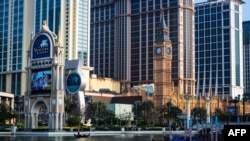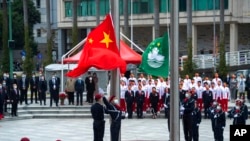More than a week after Macao’s legislative assembly passed controversial amendments to the former Portuguese colony’s national security law, a sense of uncertainty pervades in the vibrant and popular gambling and tourist destination, with some people remaining mum about the law taking effect this week.
Since the measure’s passage, some journalists, writers, and businesspeople contacted for this article have refused to be interviewed out of fear of repercussions for expressing concerns about the amended law.
“It’s not appropriate [or convenient] to accept interviews on the national security law,” was the common response.
Others, however, were seeking answers on how the law would affect day-to-day life.
The amendments, passed unanimously by the legislature May 18, are aimed at upgrading the Law on Safeguarding National Security, first enacted in 2009, a decade after Macao returned to Chinese sovereignty.
A statement on Macao’s government website said the amendments were necessary because “the country [meaning China] is facing a more complicated and changing security and development environment,” making safeguarding national security “increasingly arduous.”
The amendments will enable Macao to “more effectively respond to future internal and external security situations,” it said.
Without giving details about what those threats are, the website lists changes to the law, including:
- expanding the definition of secession to include acts carried out by nonviolent means;
- widening the definition of sedition to include “acts that incite participation in riots;”
- renaming the crime of “theft of state secrets” to “violation of state secrets.”
The amendments also change the references to the crime of collusion with “foreign political organizations” to simply collusion with "organizations outside Macau” that are seeking to damage national security. This could be aimed at pro-independence groups in Taiwan, which Beijing considers to be a part of China.
They also call for punishing “outside hostile forces” and locals who support them with the intention of harming national security by trying to influence Macao’s elections, advocating sanctions against the enclave, and trying to make Macao's people hate the central government in Beijing.
Analysts said Beijing, alarmed by weeks of widespread and sometimes violent protests against an extradition bill in Hong Kong in 2019, wants to close loopholes in the law, to prevent such occurrences in Macao. They say China's government had nudged Macau's chief executive and legislature to pass such amendments in the past, but there was reluctance until now.
“When Hong Kong experienced political turmoil in 2019, Beijing was definitely threatened by the social movement. … Therefore, the amendment of Macao’s national security law, in the eyes of Beijing, is to fill up the legal loopholes in Macao,” said Eilo Yu Wing-yat, associate professor at the University of Macau’s Department of Government and Public Administration.
Asked why Beijing would feel the need to toughen control measures in Macao, given how peaceful it is compared to Hong Kong, Victor Gao, a professor at China’s Soochow University, agreed that the Hong Kong protests were the catalyst and Beijing felt it should take preemptive measures.
“Any political system would not tolerate secession or rebellion,” Gao said, referring to some Hong Kong protesters advocating for the territory's independence and others storming the local Legislative Council building at one point. “Therefore, Macau needs to close the loopholes, so that if anyone tries the same thing in Macau, they will have the legal wherewithal to deal with these anti-social stability, sabotaging acts.”
Other analysts, however, say the amendments widen the scope of actions under which individuals and groups can be punished, and this could harm Macao’s freedoms.
“The expansion of national security offenses to include non-violent means and inciting participation in ‘riots' will further chill an already frosty civil society, media, and academic space,” wrote Jason Buhi, associate professor at Barry University’s School of Law in Florida and author of The Constitutional History of Macau, in an email.
What is especially worrying is that crimes involving "incitement" and "state secret" are not well defined, which could have a major impact on the freedom of press and speech in Macao, and the public's right to know, according to a statement posted by the 100-member Macau Journalists Association on its Facebook page in March.
The association said that while government officials have repeatedly stated that policy discussions will not be affected by the national security law, real discussions inevitably involve criticism of government policies or officials’ actions. It questioned whether these will now be seen as inciting hatred or confrontation against the government.
“The arbitrary nature of legal interpretation is extremely high, making journalism a high-risk industry,” the association said.
Not defining what is considered state secrets also puts journalists at risk of violating the law, the association said.
It “is like a bottomless abyss for journalists who have to collect a lot of information every day,” the journalism group said.
According to MacauBusiness.com, local officials have issued assurances that the amendments include safeguard mechanisms against abusive use and “shall not harm the human rights of suspects.”
The journalists’ association has asked for clarification, arguing that the legislature and government have a responsibility to let the public clearly understand what constitutes a crime under the amended law.
Like Hong Kong, Macao was promised a high degree of autonomy without changes to its political, social and economic freedoms for 50 years after returning to Chinese sovereignty.
Some businesspeople who are not involved in politics said they also have to be cautious.
“I see people who talk about it [the national security law] and they’re immediately targeted,” said a small business owner who requested anonymity. “If you become too vocal, then they pick on you. For instance, they can be strict about approving your workers’ work permits. I can’t say it’s a coincidence.”
Unlike Hong Kong, however, Macao residents have shown no appetite for challenging the government’s authority. About half of its 674,000 population were born in mainland China. Many are familiar with the government’s heavy-handed control over society and see Macao as being much freer than the mainland.
At the same time, some people are quietly worried.
“To many Macao residents, they may feel powerless regarding the reform and may consider opposition against it would probably lead to the further suppression and repression … similar to the current Hong Kong,” Yu said.






